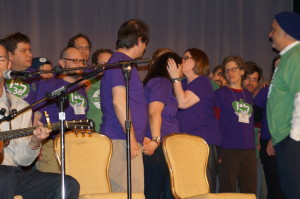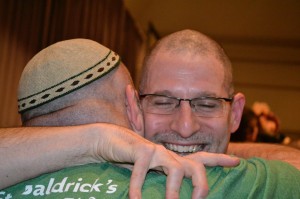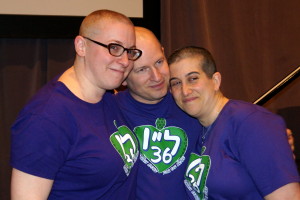Last week, after months of planning, scores of rabbis from across North America shaved their heads as part of the #36rabbis project. (Here is the Rashi on the #36rabbis.)
It was a transcendent experience.
And one that has raised more than half a million dollars as the top St. Baldrick’s event of the year and the third highest grossing event in St. Baldrick’s history.
***
The morning after the Shave, a colleague sneered, “I notice you didn’t shave.”
{{ouch}}
Perhaps this colleague was attempting to be funny.
Or allaying his or her own guilt.
Or, more likely, this person is one of the many who have found it necessary to make a pointed comment to those of us involved in the event who did not shave.
This is mitzvah-shaming.
Like fat-shaming or slut-shaming, mitzvah-shaming is the act of making someone feel inadequate, guilty, or inferior based on a behaviour or set of behaviours that puts the individual outside of the cultural norm. Mitzvah-shaming is when someone derides an individual for not observing the same mitzvah as the rest of the group.
Such as not keeping kosher, not observing Shabbat, or, as in this case, not participating in the #36Rabbis Shave for the Brave.
And it is unconscionable.
In our post-Emancipation Jewish community, one’s sense of commandedness emanates from one’s relationship with God. Reform Judaism fiercely encourages religious autonomy and, therefore, does not permit mitzvah-shaming.
When Rabbi Phyllis Sommer and I conceived of the #36rabbis, we did it knowing that there would be those colleagues who would take on the burden of temporary disfigurement and that there would be others who, for a variety of personal reasons, would support us in other ways. We did not ask anyone to explain his or her decision not to shave — although some did choose to share it with us. We did not pass judgement on those who have chosen not to shave at this time. And neither should anyone else.
Ultimately, as with all behaviours, it is the One Who Sits in Judgement who will judge. Both those who chose not to shave…and their disparagers.




{ 15 comments… read them below or add one }
A product of your own success.
Well said! We need to use our gifts in many different ways to carry out the work of healing this world.
I am grateful for the huge mitzvah you did in organizing a miracle, Rebecca.
YOU, and you alone are responsible for bringing an idea that you and phyllis had to life. once you got the idea out there, it spread and grew like crazy in a wonderful and magical way. no, you didn’t shave. but because you wanted to do something, to help in some way, that something translated to nearly 97% of $613million being raised for st. baldricks.
It is not only mitzvah-shaming, but could also be shaming someone for having a medical reason to not shave… I immediately thought of someone who has psoriasis or other scalp affliction that is usually hidden by a full head of hair… That person would have much more difficulty navigating the world bald than someone with a healthy scalp…
How awful. What did you say? Did you cock your head to the side and say, “Oh. Are you sure you didn’t mean mazel tov on helping raise half a million dollars for pediatric cancer research?” Although I admit my first reaction would be, “Yeah, neither did you.”
After I removed the dagger from my soul, I think I muttered something like “I was the mitzvah-facilitator and we raised more than half a million dollars.” I like your phrasing much better and wish that I would have thought of it.
Well, it’s easy to Monday morning quarterback.
I love this article on “mitzvah-shame.” I love how you name this, and articulate why it is so rotten to do to one another – And I’m so glad I came across this blog post via my friend Jill Zimmerman!
It’s like the arrogance of assuming that ‘speed-davvening’ is somehow “BETTER” than deep davvening…..empty competition based on external observation, designed to shame the other and somehow elevate the speaker. A shanda on the “shame-er”.
Was anyone else thinking “then did *sneer* the son so wicked”?
What I am about to state is not to make martyrs of you and of your friends and colleagues who worked for months to make this event happen. However, stripping oneself of time that could have been spent more with family, shedding any pride when it came to asking people for donations and shaving- yes shaving off any other priorities to honor a little boy’s too early death is something we all are proud and in awe of!
Sure, it was noticed. In the pictures of amazing people it was visible, some shaved. Some didn’t. All joined together for an incredible purpose to raise money for an important and worthy cause. The point of who shaved and who didn’t is irrelevant. It is shaming, but it is also a way of making oneself feel better about their own inadequacies. (That word looks spelled wrong, if so, oops.) But that matters not, because that is not how to make yourself feel better. If that person did shave, they obviously felt it was not enough. If they didn’t, then whatever they did was not enough. To them. I say this not to kvell for your efforts, but in sadness for their own focus, or lack thereof. You are amazing. A woman I would want on my side no matter what I tried to tackle. This person needs to recognize the error of their ways and move forward with respectful efforts and measures in which they make up for their foolishness. Huge hugs to you. And props, for sharing these words.
1. a huge yasher koach on what you accomplished
2. Your point about mitzvah shaming is so important, and something I’ve been trying to put my finger on lately. It’s something I’ve experienced quite a bit of growing up in Orthodox communities (I’ve also experienced a community that was quite intentional about not mitzvah shaming people). Even in a context of normative halacha, mitzvah shaming is counter productive to genuine relationships between people and with God. Thanks for helping me think this through!
I’ve never heard that term used before but it is so true! Let’s hope the deed was done with a genuine spirit despite the need to shame about it.
I’m pretty certain that I just coined the term 🙂
It really was an amazing experience and I’m so grateful to be a part of such a meaningful project.
Thanks for stopping by and joining the conversation, Jessica!!
{ 1 trackback }